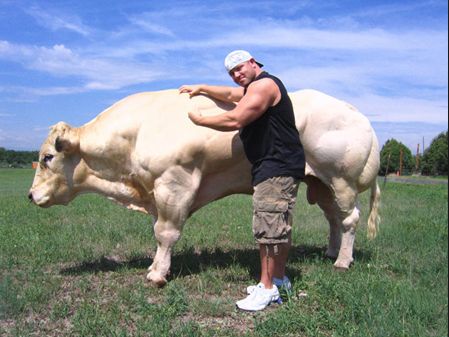Most of us have seen those pictures of extremely muscular cows. While this may appear to be the result of something in the body working too well, its actually the opposite. In their bodies, and in ours, myostatin is a protein that limits the amount of muscle the body can hold on its frame. Seeing potential clinical applications, scientists investigated the effects this may potentially have on individuals with muscle wasting diseases by causing the genes responsible for the proper production of myostatin to mutate in mice. After these mutated mice developed they investigated the potential effects of their excessive musculature on their ability to put it to use. Unfortunately, while the mice did have more muscle mass, this came at the cost of impaired force generation, and in fact the myostatin mutant mice were actually weaker than their wild-type counterparts.
In the realm of social media, there has been talk on the effects a myostatin deficiency may have on human performance, such as in anaerobic sporting events (sprinting, lifting weights, anything short term), and bodybuilding. Geneticists in Lithuania investigated this relationship by looking at a variation in the MSTN gene in athletes and non athletes, where they really only found that one allele for this gene that caused the deletion of myostatin may be correlated with better performance in endurance oriented activities. In my opinion, a complete surprise, but nonetheless very interesting. The idea of there being a gene that makes someone predisposed to putting on more muscle (which, with the amount of genetic variation in the world it's out there) sounds almost like science fiction, but with how our scientific knowledge is developing, I wouldn’t be surprised if one day we had the ability to use genetic engineering in the same way we use performance enhancing drugs. Each of the studies referenced has additional, very interesting information you should check out, such as how they would potentially treat muscle wasting conditions as well as additional information on the human genetics involved in myostatin deficiencies.

No comments:
Post a Comment